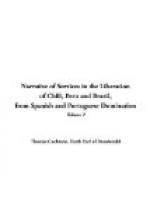Thus was a right understanding established, my only object during the undignified contentions which had arisen, being—relinquishment of the proffered command, in order to carry out my long-entertained intention of visiting Greece, then engaged in a struggle for independence—or to obtain a definite arrangement with the Brazilian Government, which should recognise the circumstances under which I had been induced to quit Chili—confer upon me permanent rank—give me the equivalent promised with regard to pay—and be binding on both parties.
On the 29th of March, a proclamation was issued by the Imperial Government declaring Bahia in a state of blockade, the Portuguese having there assembled a combined naval and military force superior to that of Brazil, and, under ordinary circumstances, fully competent to maintain itself; as well as to put down, or at least paralyse, any movement in favour of independence.
The following orders were then communicated to me, and were of the usual kind, viz. “to capture or destroy all enemy’s ships and property, whereever found:”—
His Imperial Majesty, through the Secretary of State for the Marine, commands that the First Admiral, Lord Cochrane, Commander-in-Chief of the Squadron, shall, to-morrow morning, proceed from this port with such vessels as he shall judge proper to the port of Bahia, to institute a rigorous blockade, destroying or capturing whatever Portuguese force he may fall in with—doing all possible damage to the enemies of this Empire, it being left to the discretion of the said Admiral to act as he shall deem advantageous, in order to save that city from the thraldom to which it is reduced by the enemies of the cause of Brazil; for this purpose consulting with Gen. Labatu, commanding the Army, in order to the general good of the service, and glory of the national and Imperial arms.
Palace of Rio Janeiro, March 30, 1823.
LUIZ DA CUNHA MOREIRA.
To the Brazilian party and the mass of the people generally, the approaching departure of the squadron was a matter for congratulation, but to the Portuguese faction it presented a cause for fear, as tending to destroy their hopes of re-establishing the authority of the mother country. Their influence, as has before been said, was as great, if not greater, than that of the patriots, and being more systematic, it had been effectually employed to increase the disaffection which existed in the Northern provinces to the—as yet—but partially established authority of his Imperial Majesty.
It is not my intention for a moment to impute malicious motives to the Portuguese faction in Brazil. The King of Portugal, Don John VI. had, within twelve months, quitted their shores to resume the throne of his ancestors, so that they had a right to the praise of loyalty, and the more so, as at that time few calculated on separation from the mother country. The Empire itself was not six months old, and therefore they were not to be blamed for doubting its stability. The Cortes at Lisbon had sent a large force for the protection of the more remote provinces, and in an attack upon these at Bahia, the Brazilian troops had been unsuccessful, so that no great confidence was to be reposed on any future military efforts to eject the Portuguese troops.




